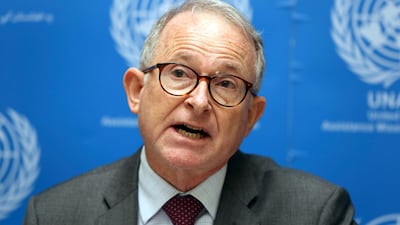More civilians were killed in Afghanistan last year than any other year since 2009, according to an annual report by the UN released on Sunday
The UN Assistance Mission in Afghanistan documented nearly 11,000 civilian casualties with more than 3,800 killed. The UN defines a casualty as anyone who is wounded or killed as a result of armed conflict. Nearly 1,000 of those killed were children.
UN envoy Tadamichi Yamamoto called the spiralling number of civilian casualties "deeply disturbing and wholly unacceptable".
The report attributed the majority of civilian casualties to anti-government elements, with the Taliban reportedly responsible for 37 per cent and the local ISIS branch for 20 per cent. Deaths attributed to ISIS rose to more than 118 per cent compared with the previous reported year.
A contributing factor to the high number was the continued use of improvised explosive devices in civilian areas and suicide attacks.
The report comes ahead of the next US-Taliban talks in Qatar on Monday.
Marathon talks held in Doha last month have stoked hopes of a breakthrough after the two sides walked away with a "draft framework" that included a Taliban commitment to prevent Afghanistan from once again becoming a safe haven for international terror groups.
The report documents that the Taliban and Afghan government forces have attempted to mitigate civilian casualties, yet are both responsible for more deaths than in 2017.
Casualties due to aerial operations by coalition and Afghan forces were at record highs. Civilians caught in crossfire between anti-government elements and security forces made up 10 per cent of the total civilian casualties.
The deadliest day in 2018 for Afghan civilians was October 20, the day of parliamentary elections when 453 civilian casualties were reported across the country, with 56 killed. The single deadliest attack was a car bombing in Kabul on January 27, when a suicide bomber detonated a device inside an ambulance in Kabul, killing at least 95 and wounding 235 others.
Michelle Bachelet, United Nations High Commissioner for Human Rights, said in a statement included with the report: “I call on all parties to the conflict to fully respect international humanitarian and international human rights law to protect the lives of all civilians”.
Another round of peace talks between the US government and the Taliban was set to take place in Pakistan this month but fell apart due to the Taliban being unable to travel to Islamabad, despite much of their leadership residing there.

